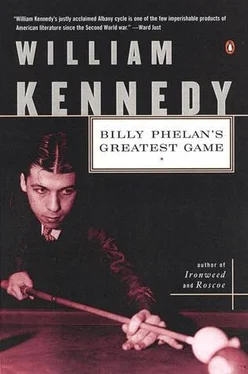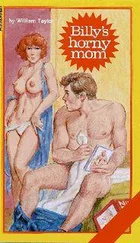“Don’t leave him in my alley,” Nick said.
Bud Bradt came right back and Nick said, “Where’d you put him?”
“In the gutter between two cars.”
“Good,” said Nick. “Maybe they’ll run over him.”
“I would guess,” said Martin, “that that would look very like a murder to somebody. And that’s not only illegal, it also requires explanations.”
“Yeah,” said Nick, crestfallen. “Put him up on the sidewalk.”
Martin went outside with Bud in time to see the kid hoisting himself up from the gutter with the help of the bumper of a parked car. The kid drew up to full height, full pain, and a fully bloodied face. He looked toward the alley and saw Martin and Bud, and then, with strength rising up from the secret reservoir fear draws upon, he turned from them and ran with a punishing limp across Clinton Avenue, down Quackenbush Street, down toward the waterworks and the New York Central tracks, and was gone then, fitfully gone into the darkness.
“Didn’t kick him enough,” Bud said. “The son of a bitch can still run. But he’ll think twice before he does that again.”
“Or shoot somebody first to make his point.”
“Yeah, there’s that.”
Footers had come up behind them in time to see the kid limp into the blackness. “I was in a crap game once,” Footers said, “and a fellow went broke and put a pistol on the table to cover his bet. Five guys faded him.”
Martin saw the kid limping into the beginning of his manhood, victim of crazy need, but insufficient control of his craziness. Martin had been delighted to see the kid sucker-punched five minutes earlier, salvation of the Galway wedding band. Now he felt only compassion for a victim, lugubrious emotions having to do with pity at pain, foreboding over concussions, lungs punctured by broken ribs, internal ruptures, and other leaky avenues to death or lesser grievings. Victims, villains were interchangeable. Have it both ways, lads. Weep for Judas at the last gasp. We knew he’d come to the end of his rope. He couldn’t beat the fate the Big Boy knew was on him, poor bastard.
“I don’t know what the hell to do with this pot,” Nick was saying as they reentered the cellar. He was still picking quarters off the floor.
“Give it to Billy,” Morrie said. “He deserves it.”
“You’re a genuine hero,” Martin said to Billy. “Like the quarterback who makes the touchdown with a broken leg. There’s a heroic edge to such behavior. You think bullets don’t kill the single-minded.”
“Weird day,” Billy said. “I took a knife away from a looney in the Grand Lunch a few hours ago.”
The others stopped talking.
“This kid was poking near my belly,” and Billy showed them and told them about the coffee game.
“But you had a weapon in the coffee,” Martin said. “Tonight you had nothing. You know a twenty-two slug can damage you just as permanently as five rounds from a machine gun. Or is your education lacking in this?”
“I didn’t think like that,” Billy said. “I just wasn’t ready to hand over a night’s work to that drippy little bastard. His gun didn’t even look real. Looked like a handful of candy. Like one of them popguns my nephew has that shoots corks. Worst I’m gonna get is a cork in the ear, that’s how it went. But the money counted, Martin. I owe people, and I was hot for that pot, too. I had kings and nines, ready to fill up.”
“Billy should get a chunk of that pot, Nick,” Morrie said.
“He got two handfuls,” Nick said.
“That was his own dough going back home,” Morrie said. “What about the rest? And Bud ought to get something. Without them guys, I’d have personally lost one hell of a bundle.”
“Everybody oughta split the pot,” Lemon said. “Nobody had a winning hand.”
“Especially you,” Footers said.
“You folded, Lemon, forget it,” Morrie said.
“Fuck you guys,” Lemon said.
“Why you gommy, stupid shit,” Morrie said. “You might be dead if it wasn’t for Billy and Bud. Your head is up your ass.”
“While it’s up there, Lemon,” Footers said, “see if you can see Judge Crater anywhere. He’s been gone a long time.”
“The only three had the power in that last hand,” said Morrie, “was Billy, me, and you, Nick. Everybody else was out of it. So it’s a three-way split. I say Billy gets half my share and Bud the other half.”
“I got enough,” Billy said.
“I’ll take it,” said Bud.
“It’s about forty apiece, what’s left, three ways. One-twenty and some silver here.” Nick counted out the split, forty to each, and pocketed his own share.
“You really keeping your whole forty, Nick?” Morrie asked, divvying his share between Billy and Bud. “After what those boys did for you and your joint?”
“Whataya got in mind now?”
“The house buys them steaks at Becker’s.”
“I don’t fight that,” Billy said.
“I ate,” Nick said.
“So eat again, or send money.”
Nick snapped a five on the table to Morrie, who looked at it, looked at Nick, didn’t pick it up. Nick peeled off another five.
“I give ten to the meal. Eat up. But is the game dead here? What the hell, everybody gonna eat? Nobody gonna play cards?”
“Dead for me,” Morrie said, picking up the fivers. And clearly, Billy and Martin were pointed elsewhere when Nick took a good look, and Footers was drawing himself another beer.
“I do believe I’ll pass, Nick, me boy,” Footers said. “That last one was a tough act to follow.”
“I’m still playing,” Lemon said, sitting alone at the table.
“You’re playing with yourself,” Footers said. “As usual.”
“Tomorrow night, nine-thirty,” Nick said. “Same time, same station.”
“Steak time, boys,” Morrie said.
Billy found Nick’s toilet and pissed before they left. While the old beer sudsed up in the bowl, he consolidated his cash. Out of the coat pocket came the handfuls of bills. He counted it all. Nice. He’d pulled more out of the pot than he put in. He wrapped it all around the rest of the wad. He still needed $275 to pay off Martin, his bankroll now up to $514.
It mounts up. No question about that. Put your mind to it and it mounts up.
No man who wore socks in Albany felt better in the nighttime than Billy Phelan, walking with a couple of pals along his own Broadway from Nick’s card game to Union Station to get the papers, including the paper that was going to make him famous tonight. Maybe he feels so good that he’s getting a little crazy about not being afraid. Martin was right. A.22 in the eye gives you a hell of a headache.
But now Billy looks around and sees this Broadway of his and knows he’s not crazy, because he knows it all and it all makes sense. He has known it this way since 1913 when he was six and his father took him in the rowboat and they rowed down the middle of the street. The Hudson had backed up over its banks and they were rowing down to Keeler’s Hotel to rescue his Uncle Peter, who had had a fight with Billy’s grandmother and hadn’t been home for a month and was caught now, stranded at the hotel with the big trunk he was taking to New York, leaving Albany to work in a Manhattan publishing house. But he could not carry the trunk on his back through two and three feet of water from Keeler’s to the station. And so his brother, Francis, became the hero who would travel across the waters to the rescue. Francis put Billy in the boat at the station and right now Billy can see the spot where he stepped off the curb into that boat, where Steuben Street intersects Broadway. The water was up to the curb there, and toward State Street it became deeper and deeper.
Читать дальше












